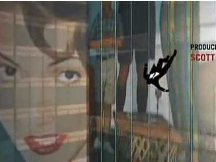
Celebrities, even former celebrities, are extremely protective about the use of their names and likenesses without permission. Rightfully so, since celebrities often receive significant sums of money from the use of their names and likenesses. Thus, when using images in advertisements, movies and television shows, all images, even images from the past, should be cleared prior to use. Recently, 79-year old model Gita Hall May ("Hall") filed suit against Lions Gate Entertainment in Los Angeles Superior Court, alleging that the opening title sequence of the hit show "Mad Men" uses her iconic image without permission.
The lawsuit alleges that the title sequence -- which depicts a man falling through the air, as he passes iconic images from the '50s and early '60s -- uses a photo of her taken by famed photographer Richard Avedon for a Revlon ad.
The complaint alleges that Hall was "arguably the top model of her era", that "her image was iconic of the era", and that "[g]iven her stature, [Hall] consented to the use or her likeness, and the Avedon photo embodying it, only for the then-current run of the Revlon campaign. At no time did she agree to allow, forty years later, her image to be cropped from the photo, in secret, and inserted as a key element in the title sequence of a cable television series, without her consent and for commercial purposes."
Hall claims that "Mad Men" has generated billions of dollars, thanks in part to the critically acclaimed title sequence, and she has not received any compensation. She claims in the complaint that the producers of "the show "have intentionally misled the public into believing that Hall endorses Defendants and their products." The complaint alleges misappropriation of right of publicity for commercial purposes, invasion of common law right of privacy, unfair competition, and false advertising, among other charges. Hall is seeking injunctive relief, damages, attorney's fees and costs.
It is possible that Lions Gate's agreement with the production company who created the title sequence warranted that the production company had the rights to all of the images in the title sequence, and perhaps Lions Gate is indemnified. It is also possible that Lions Gate acquired the right to use the photo from Revlon, without considering that it also needed to acquire rights in the underlying image. What happens in this litigation remains to be seen and it will be interesting to see if "Mad Men" has a different title sequence next season. Nevertheless, this serves as an important reminder that using a celebrity's name or likeness without consent (even a former celebrity) could result in a costly legal battle - especially if the name or likeness is used in connection with deep pockets as in the case of "Mad Men". Additionally, if you are using a third party to create materials for you, it is important to make sure that the third party has the rights to use all the intellectual property used therein and that that they will indemnify you for any issues that may arise.




